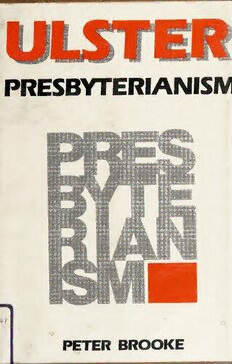
Ulster Presbyterianism: The Historical Perspective, 1610-1970 PDF
Preview Ulster Presbyterianism: The Historical Perspective, 1610-1970
PRESBYTERIANISM PETER BROOKE ULSTER PRESBYTERIANISM PETER BROOKE Any attempt to understand the Northern Ireland conflict must involve an attempt to understand the Ulster Protestant population. This pioneering book surveys the largest and most distinctive element in that population. Presbyterianism was established in Ulster on a firm organisational basis in the 1650s, under the protectorate of Oliver Cromwell. It was sufficiently strong to resist persecution after the Restoration of Charles II. It achieved a small degree of recognition by the state after the Glorious Revolution of 1689. It was, in a sense, a state within a state. Its Synods, Presbyteries and Sessions were courts in which cases concerning ministers and laymen could be heard. It exercised a rigorous discipline over its members. Its ministers and lay elders met regularly throughout the year to decide the affairs of the church. Congregations had the right to choose their ministers. All ministers had equal status and decisions were arrived at between them by majority vote. For two centuries there was a constant stream of controversial pamphlets relating entirely to theological disputes among Ulster Presbyterians, many of which had important political implications as well. This, then, was a highly organised community with a well-developed intellectual life, sharpened by continual debate. Such was their organisational and intellectual self- confidence that at the end of the eighteenth century a group of them, representing all shades of theological opinion, made a bid to seize power in Ireland in the name of French Revolutionary principles. This book examines the Ulster Presbyterian community over a period of more than three centuries. It shows how religion can contribute to the development of a sense of cultural and national identity. It therefore goes far towards showing how the Ulster Protestants have remained so troublesome for those in Britain and Ireland who would like to think of Ireland as one people under one government, separate from Great Britain. BOSTO PUBLIC LIBRARY Digitized by the Internet Archive in 2017 with funding from Kahle/Austin Foundation https://archive.org/details/ulsterpresbyteriOOpete ULSTER PRESBYTERIANISM The Historical Perspective Every earthly kingdom depends, under providence, for its origin, support and continuance, upon mere opinion . . . Henry Cooke For Walter Firpo, poet and painter. Peter Brooke V- >> ULSTER PRESBYTERIANISM The Historical Perspective 1610-1970 GILL AND MACMILLAN ST. MARTIN’S PRESS NEW YORK Published in Ireland by Gill and Macmillan Ltd Goldenbridge Dublin 8 with associated companies in Auc kland, Dallas, Delhi, Hong Kong, Johannesburg, Lagos, London, Manzini, Melbourne, Nairobi, New York, Singapore, Tokyo, Washington © Peter Brooke 1987 0 7171 1405 1 British Library Cataloguing in Publication Data Brooke, Peter Ulster presbyterianism: the historical perspective. 1. Presbyterian Church in Ireland — Northern Ireland — History 2. Northern Ireland — Church history I. Title 28572416 BX 9061.N6 ISBN 0-7171-1465-1 Published in the United States of America by St. Martin’s Press, Inc., 175 Filth Avenue, New York, NY 10010 ISBN 0-312-01271-3 Library of Congress Cataloging in Publication Data Brooke, Peter Ulster presbyterianism Bibliography: P. Includes index. 1. Presbyterian Church — Ulster (Northern Ireland and Ireland) — History. 2. Presbyterian Church in Ireland — History. 3. Ulster (Northern Ireland and Ireland) — Church History. 4. Ulster (Northern Ireland and Ireland) — Politics and Government. I. Title BX 9061.U47B76 1987 28572416 87-16705 ISBN 0-312-01271-3 Print origination in Ireland by Galaxy Reproductions Ltd, Dublin Printed in Great Britain by The Camelot Press, Southampton All rights reserved. No part ol' this publication may lx* copied, reproduced or transmitted in any form or by any means, without permission of the publishers. Contents Introduction: An Irish Intellectual Tradition vii Note on Terminology xii 1 Clearing the Ground 1 1. The Reformed Tradition in Europe 1 2. Calvinism in Scotland 6 3. Absolutism in Ireland 9 2 The Birth of Ulster Presbyterianism 14 1. A Ferment in the Church of Ireland 14 2. The Birth of High Church Anglicanism 19 3. A Scottish Calvinist Revolution 25 4. The First Presbytery in Ulster 29 5. An English Calvinist Revolution 32 6. Presbyterianism under Cromwell 37 3 A Church without Patrons 43 1. The Restoration 43 2. A Unique Dissenting Church 46 3. The First Synod of Ulster 53 4 Free to Develop 63 1. Dis tin c tiv e Prin ciples 63 2. Understanding History 66 3. Latitudinarianism in England 72 4. Latitudinarianism in Ulster 81 93 5 The New Dissenters 1. Evangelicalism and Calvinism in Scotland, England and America 93 2. Seceders and Covenanters in Ulster 104 6 Political Ambitions 112 1. An Armed People 112 2. Alliance with the Catholics 121 3. Defeat and Demoralisation 129 7 Retrenchment and Reorientation 137 1. Retrenchment: The Belfast Academical Institution 137 2. Reorientation: The Arian Controversy 145 8 Parliamentary Politics 154 1. Two Tactics: Protestant Union and Radical Sectarianism 154 2. Control of Primary Education 163 3. Control of Higher Education 169 9 From Presbyterian to Protestant 175 1. Individual Salvation and Social Organisation 175 2. Secularisation in Britain and Ireland 111 3. Radical Sectarianism Fights Back 182 4. The 1859 Revival 190 5. Part of a Wider Culture 194 Conclusion: The Ulster Protestants 198 1. Exclusion from British Political Development 198 2. Church, State and Education in Northern Ireland 203 3. The Challenge from Catholic Ireland 206 4. The Rise of Ian Paisley 211 Notes 215 Bibliography 230 Index 245
